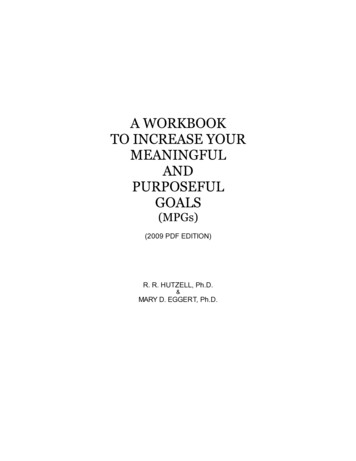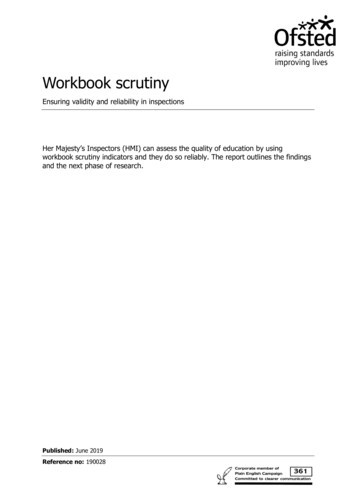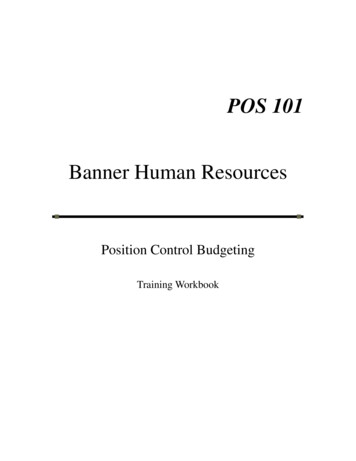
Transcription
A WORKBOOKTO INCREASE YOURMEANINGFULANDPURPOSEFULGOALS(MPGs)(2009 PDF EDITION)R. R. HUTZELL, Ph.D.&MARY D. EGGERT, Ph.D.
CONTENTSPREFACE . 2SECTION I: AN INTRODUCTION TO MPGs .1. Spending Energy on Unsatisfying Goals? .2. One of Those Little Self-Feedback Quizzes .3. This is a Self-Workbook .4. The Secret Underlying Increase Your MPGs.5. What We Mean by Values and Goals.6. No Iron-Clad Guarantees .3335679SECTION II: YOUR VALUES .7. The Values Awareness Technique.8. A Shopping List of Values .9. Values In What You Give To Your World .10. Values In What You Take From the World .11. Values In Your Beliefs/Attitudes .12. Your Values Hierarchy .10101314171921SECTION III: YOUR GOALS.13. Your Current Goals .14. Goals with a New Twist.15. Selecting Actual Goals .23232833SECTION IV: MIXING VALUES AND GOALS. 3716. Worksheets for Your Ingredients. 3717. Do Your Goals and Values Fit?. 4118. What About Those Leftovers?. 42SECTION V: CONTINUING THE PROCESS . 4519. What to do Next . 4520. Again the Self-Feedback Quiz. 461
PREFACEIf you are in the majority, you feel some lack of satisfying direction in your life. Increase Your Meaningful andPurposeful Goals (MPGs) is designed for you.Increase Your MPGs started as a counseling group for self-growth. The theme of the group sessions was tohelp people direct their lives toward more personally meaningful goals. Techniques were developed to help thesepeople set goals so important to them that they would feel excited working toward them. They searched for goals sovital to them that alcohol and drug abuse, daily frustrations, emotional symptoms, or other interferences would notsidetrack them from their progress. The group sessions were very popular, and soon many more persons wanted toattend the sessions than could be handled reasonably.So a clear need arose to find a way to make Increase Your MPGs available to larger numbers of people. Whilethe process of increasing MPGs was adjusted and improved, several leaders were taught to conduct the MPGsgroup sessions. The demand still was not met because the increased availability of the sessions resulted in evengreater demand! Thus we decided to develop a written version of the MPGs process for those many persons whocouldn't attend live training sessions.This workbook is the product of that decision. The material is aimed at people who sense a need for a satisfyingdirection for their lives – people who want truly meaningful and purposeful goals. The original version of IncreaseYour MPGs was copyrighted in 1989 (ISBN 0-917867-10-6). A Revised Edition was published in 1995. Both hardcopy editions have been out of print for many years now. But we have continued to receive many requests for theworkbook. So, rather than re-publish it in hard-copy, we decided to develop this PDF version of the workbook.Persons are welcome to copy and use this PDF version, but it is not intended for sale without permission from theauthors.Increase Your MPGs can be used as a self-help process and self-workbook. It guides you through a series ofpaper-and-pencil exercises designed to show you how to increase your personally meaningful goals. To completeIncrease Your MPGs requires some work, time, and deep but interesting thought about yourself.Throughout this workbook we provide examples of filling out the paper-and-pencil exercises that are the heart ofMPGs. We believe these examples help you to understand the exercises and stimulate your thinking about yourresponses.The examples have proven particularly useful to individuals who complete this workbook on their own. Indeed,Increase Your MPGs is written so you can complete it on your own if you prefer. However, other options haveadvantages you may wish to consider.Participants of our MPGs group sessions have considered the process of sharing thoughts and ideas to be veryhelpful. For that reason, you may wish to gather a few people to progress through this workbook at the same paceyou do, regularly stopping and sharing ideas as an informal group. Although you will reveal personal things to thisgroup through the MPGs process, the things you reveal are intended to be positive, not dark secrets you fear otherslearning about.To facilitate thinking about personally meaningful goals, many professional therapists have used Increase YourMPGs to guide them in conducting group meetings as an adjunct to formal psychotherapies. Members work on aspecified section of the workbook between sessions. Then they discuss their questions and results with theirtherapists during the group meetings.In other cases, counselors have incorporated parts of Increase Your MPGs into their ongoing individual or groupformats. These counselors use their own techniques and then, where appropriate, switch to selected sections of thisworkbook.Some persons have used Sections I and II of this workbook without completing the remainder. Doing so willtake you through clarification of your own personally meaningful values. Too few people know what values theyreally believe in. Just the simple process of discovering their own values may guide them toward their own MPGs.Sections III and IV are somewhat more complicated than Sections I and II. In them you think very specificallyboth about goals you have (or will set) and about how well your goals fit your values. If, upon completing Section II,you feel uncertain that you can set concrete goals and analyze how they fit your values, then we would encourageyou to complete Sections III and IV.Section V is very short and offers some ideas for using MPGs concepts in your future. It includes a quiz thatyou can use to help gauge your progress with MPGs.Much of Increase Your MPGs is based on principles of Viennese philosopher Dr. Viktor Frankl. After completingthis workbook, people often ask where they can learn more about Dr. Frankl and his philosophy. Places to learnmore are Viktor Frankl websites, including: http://logotherapy.univie.ac.at/ and http://www.logotherapyinstitute.org/.These and other websites offer books, audiotapes, videotapes, training opportunities, professional journals, tests,and other useful materials.2
SECTION I***AN INTRODUCTION TO MPGs***CHAPTER 1Spending Energy on Unsatisfying Goals?During quiet moments, do you ever feel anemptiness gnawing at your inner self, a sense ofboredom, frustration, directionlessness? Do youfind yourself worrying about what you haveaccomplished or not accomplished, painfully awarethat your lifespan decreases each day? Doesfacing these questions -- truly facing them -- causeyou uneasiness?Many people experience such disquietingfeelings. They lack a clear idea of where they areheaded in their lives. They lack the powerfulguidance of deeply personal goals. Perhaps theyhave a few such goals but not enough to quell theiruneasiness.They need to increase theirMeaningful and Purposeful Goals (MPGs).From our experiences with thousands ofpersons, we have seen how a lack of MPGs cancontribute to loneliness, distress, anger, alcohol/drug abuse, and a host of other addictive, risky,and maladaptive behaviors. At the same time,once people recognize they lack MPGs, thisknowledge can motivate them to change. It canmotivate them to work on increasing their MPGs.And increasing MPGs is what this workbook is allabout.Increasing your MPGs means working towardmore goals that will deeply satisfy you. When youhead toward goals you know will bring truesatisfaction, you feel an inner sense of direction.You will experience a sense of meaning in life, afeeling we humans crave.Noted philosopher Viktor Frankl has concludedthat we humans have a stronger need for meaningthan for pleasure or power.He offers hisexperiences as a concentration camp prisoner toback him up! He wrote about this in his bestsellingbook “Man’s Search for Meaning.”You probably have read stories of people whodrifted aimlessly, getting into all sorts of difficulties,until one day they recognized a personallymeaningful goal.They went on to live full,satisfying, productive lives.Such goals give us great gratification, help uslive as fully human people. Most of us, even thosewith fairly normal, average lives, need several oreven many such goals. Some will be big, longrange goals. Others may be smaller everydaygoals.Often we lack a sense of direction because werun after goals before determining that they aremeaningful and purposeful to us. How often haveyou eagerly pursued a goal, worked slavishly toreach it, and then found out you weren't satisfiedby attaining it?If you spend your energy without gettingsatisfaction from your results, then boredom,headaches, worries, alcohol/drugs, even riskybehavior and thrill seeking, can easily get in yourway and sidetrack you. Now may be the time totake a look at your life. Take it apart piece bypiece, and put it back together again with a clearersense of direction. Now may be the time to work onincreasing your MPGs.CHAPTER 2One of Those Little Self-Feedback QuizzesWould you like more information about your current MPGs status? Several quizzes have beendeveloped to measure how much sense of direction, meaning, and purpose you have in your life. Onesuch quiz follows. This quiz, the Life Purpose Questionnaire has been researched and published inseveral professional publications.Please answer the twenty questions of the quiz as honestly as you can with the answer that fits youbest right now -- Agree or Disagree.3
LIFE PURPOSE QUESTIONNAIREInstructions: Mark whether you Agree (A) or Disagree (D) with each statement, for yourself, right now.AD1. I am often bored.2. In general, my life seems dull.3. I have definite ideas of things I want to do.4. My life is meaningful.5. Most days seem to be the same old thing.6. If I could live my life again, I would live it pretty much the same way I have.7. Retirement means a time for me to do some of the exciting things I have always wanted to do.8. I have made only a little progress toward reaching my life goals.9. My life is kind of empty.10. If I should die today, I would feel that my life has been worthwhile.11. In thinking of my life, I often wonder why I am alive.12. My life does not seem to fit well into the rest of the world.13. I am usually a reliable, responsible person.14. People usually don't have much freedom to make their own choices.15. I am not prepared for death.16. Sometimes I think that suicide may be a good way out for me.17. I am usually able to think of a usefulness to my life.18. I have much control over my life.19. My daily tasks are kind of boring.20. I have discovered many reasons why I was born.In starting this section, we assume you havefinished answering the quiz. Please don't go onuntil you have.Now that you have completed the quiz, let usexplain that it was developed to predict a person'slevel of MPGs. It can be considered a good predictor if it predicts well, whether or not theindividual items make good sense to you. So youwon't look at your specific answers but rather willuse your total score as a predictor. As an exampleof what we mean, suppose we were trying topredict who would make a good professionalballplayer. Imagine we ask "What is your favoritecolor?" and most persons who go on to becomeprofessional ballplayers say "red" while everyoneelse says "blue." In this case we have a good item;we aren't concerned if the question seems silly,because it predicts what we want to know. If wehave several items that each predict fairly well, wecan use their total score as a predictor. The quizyou just completed was developed in this spirit.Score the quiz yourself to get feedback. Giveyourself one point for each of the following that youanswered Agree: 3, 4, 6, 7, 10, 13, 17, 18, and 20.Give yourself one point for each of the followingthat you answered Disagree: 1, 2, 5, 8, 9, 11, 12,14, 15, 16, and 19. Add your total points to get anoverall score that can range from 0 to 20.Before we tell you how to interpret your score,let us point out that the quiz is not infallible. It can'tpredict everyone's state of MPGs perfectly, and,consciously or unconsciously, you could easilyinfluence your answers. So evaluate the followinginterpretation in light of what you already knowabout yourself.4
Usually, people who feel that they have few orno MPGs score from 0 to 8 points. People whofeel uncertain about whether they have MPGsusually score between 9 and 17 points on the quiz.Also, people who have a sense of direction aboutsome parts of their lives but remain confused aboutother parts typically score between 9 and 17points. Persons who have many MPGs and astrong sense of direction in their lives often scorebetween 18 and 20.Initially we developed Increase Your MPGs forpersons with scores 17 and below. Persons withscores 18 and above, though, have reportedconsiderable benefit from the MPGs program. Souse your score as additional information aboutyourself, not as a final determinant of whether youshould continue in Increase Your MPGs. The factthat you have read this far suggests you may bemotivated to continue the MPGs processirrespective of your score on the quiz.You can retake this quiz at any time. If yourespond honestly, scores will vary. Just like athermometer changes over time when yourtemperature changes, so too will your quiz scorechange when your MPGs status changes. If yourquiz score changes dramatically over a very shorttime, it may reflect internal turmoil about yourMPGs status.We urge you to retake the quiz, giving honestanswers, after you complete this workbook. Thiscan give you evidence of your progress. Also, itcan indicate further work you may wish toundertake. Continue to retake the quiz in themonths to come, as you make more and moreprogress toward the goals that are truly importantto you. You should see a gradual increase in yourscores.Now let's see how this MPGs program isdesigned to work!CHAPTER 3This is a Self-WorkbookIncrease Your MPGs is a self-workbook. Inmany sections you complete paper-and-pencilexercises. You will gain the most benefit by takingtime to complete each exercise as thoroughly asyou can when it is presented. Many of theexercises build upon each other and won't makeas much sense if prior exercises are skipped.Work through this workbook at a comfortablepace. You may wish to return to some exerciseslater to add to them or revise your responses. Feelfree to do this. At the same time, give eachexercise a good effort the first time through.As a result of working through rather than justreading through Increase Your MPGs, you will findthe process takes you a longer time to complete.Fine! Spend a little extra time on planning your life.Nowadays most people spend more time planninga vacation than they spend setting goals that willinfluence the rest of their lives. By reading this far,however, you have indicated you don't want to belike "most people." You have here the opportunityto invest some time and energy in establishing aclearer sense of MPGs for your life, a clearersense of direction for your life. Use it to your bestadvantage.Throughout this workbook you will examineparts of your life that lie beyond your dailyconscious awareness. You can set the best MPGsfor your life only if you consider all aspects ofyourself. Too often people get into the habit offocusing narrowly on only a few parts of their lives.As if they were trying to describe a jigsaw puzzleby looking at just a piece of it, many peopleapproach their lives while viewing only part of theoverall picture. For example, John describedhimself as an "alcoholic," and assumed he hadsaid everything of importance about himself. Bettyfocused her attention only on her children, andviewed herself solely as a "mother." It typicallytakes much thought to add more pieces to theoverall picture of your life. All lives retain anelement of mystery, but when the "mystery level"approaches 100%, you experience much difficulty.Increase Your MPGs takes you through manyself-exercises designed to fill in pieces of your lifeby looking at what is important or valuable to get inyour life. Thus you will develop your own rawmaterials by which you can increase your MPGs.Work on this process. Play with it. And enjoy it!5
CHAPTER 4The Secret Underlying Increase Your MPGsWe want to share with you the secretunderlying Increase Your MPGs. You'll find theidea so simple that it seems obvious, yet manypeople tell us they have never thought of goals inthis manner.The basis of Increase Your MPGs isstraightforward: To fill your life with meaningfuland purposeful goals, you must work toward thoseparticular goals that allow you to experience thatwhich is truly valuable to you. To restate it: To livea life that is satisfying to you, you must live up toyour value system. Once you become aware ofyour own value system, you can set goals thatallow you to live up to it. As a result, you increaseyour MPGs.If you are like most people, you have neglectedto determine which values fall highest in yourpersonal value system. Because most people lacksuch honest study of their value system, a majorsection of Increase Your MPGs (Section II) will bedevoted to Values Awareness exercises. Mostpersons find these simple, written self-exercisesinteresting to complete.Indeed, we start with Values AwarenessBEFORE we talk about actual goals. People oftenare not fully conscious of their own values whenthey set goals. Goal attainment workshops andbooks often skip personal values as well.Omitting this step, however, can result ininadequate goals being set. It can sometimesresult in spending much effort to achieve goalsthat, ultimately, you won't find meaningful orfulfilling. At other times it can result in paralysis ofdecisions due to not knowing what is the mostpersonally important thing for you to do. And at stillother times it results in sampling of goal after goal,but never sticking with one, due to being confusedabout which one is important for you to stick withover time.If you can identify what you find truly valuablein your life, you can move in a satisfying directionby setting goals that actualize what you personallyvalue. You can increase the number of goals that,deep inside, you recognize as meaningful andpurposeful for your life.If you don't know what you find truly valuable inlife, you will have difficulty setting goals that aremeaningful and purposeful for you. A commonsign of having too few meaningful and purposefulgoals is boredom. You know you are bored whenyou force yourself awake in the morningwondering, "Why should I get up today? It will bejust more of the same old routine." You know youare bored when you spend all your energy on livingbut you lack results that are satisfying.Why not solve this problem by simply pursuingwhat you find valuable, by setting meaningful andpurposeful goals, and leaving your discomfort andboredom behind? Well, can you right now namewhat you find valuable? Putting it another way,can you identify your personal values? If you arelike most people, you can't correctly list all of yourmost important values automatically but need tolearn how to discover them.When did you have training in determining yourvalues? Did you take Value Recognition classes inschool? Probably not.Although you likely weren't taught how todecide what you find valuable, you no doubt facedplenty of people who were willing to tell you whatyou should find valuable. From birth on, you weretold you should accept particular values. First yourparents, then your friends and acquaintances, andlater others, all tell you that you should acceptcertain values and abandon others. Probably bestat persuading you to accept their values are theadvertisers. These persons and companies areexperts by virtue of a selection process in whichonly the most effective survive.Successfuladvertisers get rewarded with your money eachtime they convince you that you do value their ideaor product. To counteract all this influence, youneed to learn how to discover for yourself your ownpersonal value system.If you don't figure out your values, you may findyourself chasing this, that, and the other thing,never getting what you want, never knowing whatyou truly want, working toward goals that ultimatelylack meaning for you. It's as if you were living yourlife under the following conditions: "'Something' isout there for you -- go get it." You might get luckyand find it. However, with so many possibilitiesyou are unlikely to stumble across it unless youknow what that something is and go after itintentionally.Only AFTER you have explored your valuesand learned what that "something" consists of willwe ask you to focus on your goals. At that point inIncrease Your MPGs we will emphasize assessingyour current goals to make sure they fit your6
values. Some goals will, others may not. SectionIV of this workbook will show you a method to setnew goals that agree with your values.As you might guess, one likely result ofcompleting Increase Your MPGs is that you setsome new goals. You also may change some ofyour current goals. Another likely result is that youwill find that some of your current goals really aremeaningful in your life. These may be goals thatyou have had for a long time but neglected or tooklightly. You may become aware of previouslyignored values that flood various parts of your lifewith a totally different, fresh meaning. As a result,you may experience increased motivation to workat the same goal you have ignored for years. Yousimply become more aware of how important thegoal is for you to accomplish.Now, let's return to that earlier condition underwhich many persons live their lives: "'Something'is out there for you -- go get it." But let's add aclearer meaningful and purposeful goal to it. Let ussay that through a self-discovery process (such asIncrease Your MPGs) you discover that X isimportant to you. Let X stand for one of the mostvaluable things that will ever occur for you. Notsomething that someone else thinks should beprecious to you, but something you truly andthoroughly do value. It might be love. It might beself-confidence. It might be wisdom. Or whatever.Let us say that X is available in the lobby of themain public library in the largest city in the country.This description now lets you set a very cleardirection, a meaningful and purposeful goal. Yourgoal -- get to the main public library in the largestcity in the country!When presented with this MPG, few would say-- "I'm bored. Why should I get out of bed? I reallyhave nothing I want to do." You have somethingyou want to do -- proceed to the city.Few would say -- "I'll get to the city eventually,but let's go to the bar first. We can drink for a whileand then I'll think about going to the city andchecking to see if X is still there."Few would say, "Oh gee, I'd really like to get tothe city and pick up X, but I feel a headachecoming on and I just can't make it today. Maybe I'llgo tomorrow or the next day, if I feel better."No! Once you have a goal that truly will satisfya personal value, a meaningful and purposefulgoal, you likely will progress eagerly to the goaland fulfill that value. You would not let little thingsget in your way.Similar to the above example, Increase YourMPGs is designed to help you set clearer MPGs inyour own life. You will be guided through a methodby which you can clarify your personal valuesystem and then set goals that will actualize yourtrue values. You will be guided through a methodby which you can increase your MPGs!CHAPTER 5What We Mean by Values and GoalsWe have emphasized that you can set MPGsto actualize your personal values. You may ask,“What do we mean by ‘values’?” And how do wedefine "goals"?In Increase Your MPGs, we broaden "values"beyond a moralistic or religious definition to meanall those things that, deep within yourself, are rightand good for you. When you experience them ingoals, they make your life better; they are thingsyou find personally meaningful in your life. Thisdoes include any religious or spiritual ideals thatyou have willingly accepted, but it goes further. Ifyou value the opportunity to cook, we would saycooking is a value of yours. If you enjoy spendingtime observing nature, you value nature.Goals, on the other hand, are the specificmeans by which you actualize your values. Forexample, you may value power. Experiencingpower through your goals may be satisfying to you.If you are aware that you value power, you canchoose many specific goals that allow you toactualize your underlying value for power. ThePresident of the country has much power. So doesthe president of a corporation or someone who isself-employed. But so does a Little League coachor a Girl Scout leader. Power can be experiencedin an athletic activity that you do well. Power canbe felt when you write a persuasive letter to theeditor, play well at a game, and so on. You see,many specific goals can actualize the broad valueof power.Clearly, different people can have differentvalues. For example, Steve prefers solitude inleisure activities while Vicki seeks companionship.7
Most often, however, people prefer to have bothindividual and group leisure activities, but maydiffer in how they balance the two. David choosessolitary activities three-fourths of the time; Jodyseeks groups 90% of the time; Lois opts to splitindividual/group recreation 50-50. Oftentimes youdeal with the relative strengths of several valuesrather than their total inclusion or exclusion. Youmay value both the individual and group activitiesbut rank one above the other, indicating an order toyour values. To increase your MPGs, you can seehow to make sure your goals are in line with yourordered value system in Section IV of thisworkbook.Sometimes people ask, "What if I don't haveany values?" With our definition, whatever ismeaningful to you deep inside is a value of yours.Everyone has things that are personallymeaningful for them, so everyone has values.Currently, you may not be aware of your values, oryou may have some of your value systemconfused, but you do have values.Often people add "But what if I discover that Ihave bad values?"We reply that valuesthemselves are not good or bad. What countsmost is knowing which values have meaning foryou. Bad comes when you neglect certain of yourvalues and live your life as if other things weremore important. This leads to goals that, even ifaccomplished, allow little sense of personalmeaning or satisfaction for you.If there are no bad values, why do somepeople do such bad things? The answer lies notwith the values, but in other areas. Frequentlypeople do bad things because they pay little heedto their values. Perhaps they react automatically toa situation without considering its relationship totheir value system.In other cases, personschoose bad goals by which to actualize theirvalues. This does not make the values themselvesbad -- only the goals chosen to actualize them. Adifferent goal, a good one, could be substituted forthe bad goal, and the same value could beactualized.As an example, again consider the value"power." If power is one of your values, you mightchoose to actualize it by arming yourself, hijackingan airplane, and making the evening news. On theother hand, you might choose to actualize yourvalue of power by serving as a local coordinator foran organization that promotes health research. Inboth cases, you are actualizing your underlyingvalue of power. In the former, you actualize itthrough a bad goal, while in the latter, youactualize it through a good goal. In both cases, thejudgment of "good" or "bad" applies only to thespecific goal.Our human existence requires cooperativevalues upon which to base our behavior. In asense, affirming other human beings andrespecting nature is "in our genes." If it wasn't, ourancestors would not have cooperated with eachother enough to advance beyond prehistoricstages. Without cooperation, we would have destroyed ourselves long ago. We could not functionas we do today.Think about it.Withoutcooperation, would you have your current shelterto protect you from the elements? Would you havean adequate means of transportation? Would youhave me
You will experience a sense of meaning in life, a feeling we humans crave. Noted philosopher Viktor Frankl has concluded that we humans have a stronger need for meaning than for pleasure or power. He offers his experiences as a concentration camp prisoner to back him up! He wrote about this in his best











